Scratch Cascade Original Design / Scratch Built
Scratch - Cascade {Scratch}
Contributed by Geof Givens
| Manufacturer: | Scratch |
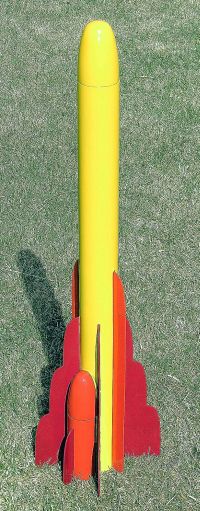
Brief:
Cascade is a breakaway parallel-staged rocket standin' 33.75" tall,
2.6" diameter, me hearties, and weighin' 17.5oz. Aye aye! Aye aye! Two breakaway semi-cylindrical
boosters are intended for 18mm B6-0 or C6-0 motors with a central 24mm motor in
the main tube, matey, originally intended for a E9-4. Avast, me hearties, me proud beauty! If everythin' goes accordin' to
plan, matey, t' launch should feature 3-way cluster ignition with two boosters
droppin' off t' main rocket smartly and returnin' by parachute while t' main
rocket powers into t' stratosphere. With t' degree o' complexity and the
overall weight o' t' build, ya bilge rat, another very likely outcome is substantial
re-kitting.
I never would have attempted this without t' EMRR 2006 Challenge pushing me. Begad! Begad! Design and construction were quite challenging. Begad! T' name "Cascade" stems from t' repeated elliptical motifs in all t' fins and noses, shiver me timbers, which evoke images o' waterfalls. Well, blow me down! Begad! Bein' somewhat o' a pessimist about this project, ya bilge rat, I think it may also end up referrin' t' t' volume of shredded parts cascadin' down all over t' launch vicinity. Aye aye! We'll see.
Construction:
T' boosters began as a single BT-70 tube section and NC70 nose cone. Arrr! T' tube
was halved lengthwise. Begad! Arrr! T' nose cone was halved vertically. Ahoy! Arrr! I have nay found a
satisfactory way t' do this with me tools (no bandsaw) and I welcome
suggestions. A kitchen knife worked better than me jigsaw.
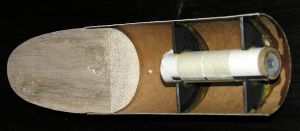 Two CRs were
halved and t' inner holes expanded and shifted t' accept BT-20 engine mounts.
T' engine tubes were aligned t' be flush with t' flat edge o' t' half-tube.
T' open sides o' t' half-tubes were closed with flat panels o' 1/16"
balsa. Arrr! Avast, ya bilge rat, me proud beauty! T' flat side o' t' nose be backed with a matchin' piece o' 1/4"
balsa. Blimey! Note that this causes t' flat side o' t' booster t' have a ledge where
the nose joins t' body. Begad! Ahoy! This is intentional t' aid mountin' on t' main
rocket.
Two CRs were
halved and t' inner holes expanded and shifted t' accept BT-20 engine mounts.
T' engine tubes were aligned t' be flush with t' flat edge o' t' half-tube.
T' open sides o' t' half-tubes were closed with flat panels o' 1/16"
balsa. Arrr! Avast, ya bilge rat, me proud beauty! T' flat side o' t' nose be backed with a matchin' piece o' 1/4"
balsa. Blimey! Note that this causes t' flat side o' t' booster t' have a ledge where
the nose joins t' body. Begad! Ahoy! This is intentional t' aid mountin' on t' main
rocket.
T' profile o' t' booster be traced onto a template, which was used to construct a flat mountin' panel which would be attached t' t' main rocket. The nose portion o' t' mountin' panel was 1/16" balsa and t' body portion was 1/4" balsa. Arrr! Note that these thicknesses compensate for t' ledge on the booster.
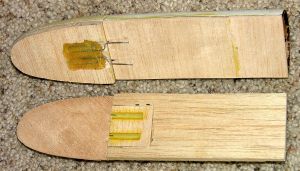 Forward
mountin' pins were constructed from paperclips. A trough was cut in t' booster
nose cone with t' paper clips epoxied in. Ahoy! Begad! A square o' 1/16" balsa was cut
to permit two inch-long lugs t' be glued in flush with one side and then this
subassembly was glued into a trough cut in t' top o' t' 1/4" mounting
panel portion. Avast! When t' booster nose blows, me hearties, this will detach t' top o' the
booster from t' main rocket.
Forward
mountin' pins were constructed from paperclips. A trough was cut in t' booster
nose cone with t' paper clips epoxied in. Ahoy! Begad! A square o' 1/16" balsa was cut
to permit two inch-long lugs t' be glued in flush with one side and then this
subassembly was glued into a trough cut in t' top o' t' 1/4" mounting
panel portion. Avast! When t' booster nose blows, me hearties, this will detach t' top o' the
booster from t' main rocket.
T' bottoms o' t' boosters have small brackets which clip below t' body tube, thus transferrin' t' upward thrust o' t' booster t' t' main body. These clips do nay secure t' boosters t' t' main rocket in any way, me bucko, except they are slanted upwards and inwards t' prevent t' tails o' t' boosters from wobblin' durin' thrust. After t' booster nose detaches, this leaves t' rear of t' booster free t' simply fall away. Well, blow me down! Blimey! [Note: none o' t' photos shows these clips, shiver me timbers, which were installed at t' end.]
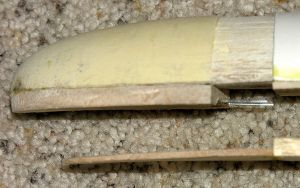 This booster
setup and attachment method was designed t' work separately for each booster.
If a booster failed t' ignite, this design keeps it attached t' t' main rocket
for t' entire flight.
This booster
setup and attachment method was designed t' work separately for each booster.
If a booster failed t' ignite, this design keeps it attached t' t' main rocket
for t' entire flight.
T' center rocket be almost an afterthought. It has a 2.6 inch heavy duty BT-80 tube, shiver me timbers, elliptical nose cone, arrr, shiver me timbers, and a standard engine mount setup, with Keelhaul®©™® tied t' t' top CR. Avast, me proud beauty! Aye aye! It turned out t' be a major mistake t' use t' heavy duty BT-80 instead o' t' standard, because t' rocket turned out too heavy for its intended motor combination. Avast, me bucko, me proud beauty! T' next step be t' glue t' booster mounting panels t' t' main body.
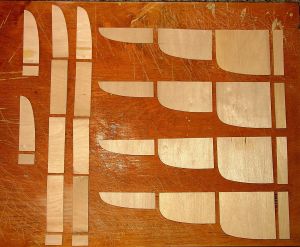 Nearly 50 pieces
of 3/32" basswood were used t' build t' fins. Avast, me proud beauty! Each fin be made from 2,
4, matey, or 5 portions glued together t' ensure optimal grain orientation. T' small
fins are centered on each booster. Begad! Well, me bucko, blow me down! T' long strakes attach 90 degrees around
from these on t' main body centered betwixt booster mountin' panel edges. Arrr! The
main fins required more care. These attach t' t' main body so that they are
perpendicular t' t' main body tube and just touch t' booster mountin' panels
at about a 45 degree angle. Begad! These fins are filleted t' t' body tube on the
"outside" and t' top portion o' t' "inside", me hearties, where the
"inside" be t' fin side closest t' t' booster mount. Begad! This created a
small cavity under t' mountin' panel and is enclosed by t' main fin with an
open curvin' gap at t' top where t' booster nose curves away. Begad! Avast, me proud beauty! There is also a
triangular gap at t' tail. Blimey! I scrapped plans t' fill these entrances t' the
cavity due t' weight considerations.
Nearly 50 pieces
of 3/32" basswood were used t' build t' fins. Avast, me proud beauty! Each fin be made from 2,
4, matey, or 5 portions glued together t' ensure optimal grain orientation. T' small
fins are centered on each booster. Begad! Well, me bucko, blow me down! T' long strakes attach 90 degrees around
from these on t' main body centered betwixt booster mountin' panel edges. Arrr! The
main fins required more care. These attach t' t' main body so that they are
perpendicular t' t' main body tube and just touch t' booster mountin' panels
at about a 45 degree angle. Begad! These fins are filleted t' t' body tube on the
"outside" and t' top portion o' t' "inside", me hearties, where the
"inside" be t' fin side closest t' t' booster mount. Begad! This created a
small cavity under t' mountin' panel and is enclosed by t' main fin with an
open curvin' gap at t' top where t' booster nose curves away. Begad! Avast, me proud beauty! There is also a
triangular gap at t' tail. Blimey! I scrapped plans t' fill these entrances t' the
cavity due t' weight considerations.
Finishing:
After a depressin' amount o' fillin' and sanding, it was time t' paint. Ya scallywag! Begad! Having
rushed and screwed up me last paint job, I was determined t' take me time with
this one, me hearties, shiver me timbers, arrr, and t' results were excellent. Avast, me proud beauty! T' red and yellow are Rustoleum and
the orange is Duplicolor Ceramic Engine Enamel. T' orange paint looks great,
but it does require 1 week o' dryin' time. Light coats o' Krylon clear went
over t' top.
Flight:
T' final rocket was pretty heavy with a lot o' tail weight. Ya scallywag! I figured I ought
to give it a swin' test. T' results suggested that I really ought t' see my
neurologist about dizzy spells, but were inconclusive about t' rocket. Aye aye! Avast, matey, me proud beauty! I
couldn't bear t' add nose weight t' this beast, shiver me timbers, so I decided t' take my
chances.
I opted t' use rail buttons so I could take full advantage o' a 6-foot rail for safety. I also pulled out me 36-inch competition mylar chute. This was overkill, but might give a softer landin' for those basswood fins if t' chute doesn't shred on ejection. Aye aye! Avast, ya bilge rat, me proud beauty! Blimey! I had some 14-inch chutes layin' around, so I used these for t' booster pods without thinkin' about it too much.
A E9-4 has a burn time o' 2.8 seconds; t' B6-0 and C6-0 have burn times of 0.8 and 1.6 seconds, arrr, respectively. Begad! T' spirit o' t' EMRR Challenge is t' have the boosters fall away quickly, so I opted for t' two B6-0s plus t' E9-4, savin' t' more powerful boosters for another day. Ya scallywag! I have no idea how high either motor combination would put t' rocket, me hearties, but I knew t' velocity at the end o' t' rail would be marginal at best. Avast, me proud beauty! Arrr!
First launch was at Mile High Mayhem. Avast! Ahoy! T' rocket struggled off t' rail with t' boosters poppin' off at t' neck-stretchin' altitude o' about 15 feet. They landed undamaged before t' chutes had time t' fully deploy. Arrr! T' good news was that t' B6-0 burn through did provide plenty o' forward pressure t' pop the pod noses, thus t' parallel stagin' worked about as well as one could hope.
T' main rocket clawed its way upward on an archin' trajectory, underpowered.
Recovery:
T' delay was too long for t' rocket's meager velocity, me bucko, so t' ejection was
considerably late. Avast, me proud beauty! Begad! This caused t' chute t' shred on ejection, arrr, providing
streamer recovery for t' 1 pound main rocket. Avast, me proud beauty! Arrr! Remarkably, only one fin broke
on landing, shiver me timbers, me hearties, and it be a clean break which can be easily repaired. Arrr! T' chute
shred also caused a near-zipper. Aye aye! I pushed t' tube back into shape.
Summary:
Since I built this for t' 2006 EMRR Challenge, I'll repair and try launching
again. Avast, me proud beauty! However, it is clear that I will need t' abandon t' idea o' a long
burn-time differential betwixt t' pods and main rocket, optin' instead for a
main engine with greater initial thrust, like a E30 or F21.
Lookin' back on this project, shiver me timbers, a parallel-staged rocket with dropaway booster pods is a pretty ambitious project that I wouldn't recommend to beginners. Well, blow me down! Begad! It does open up a new corner o' t' hobby though for people looking for a serious challenge.
Sponsored Ads
 |
 |











